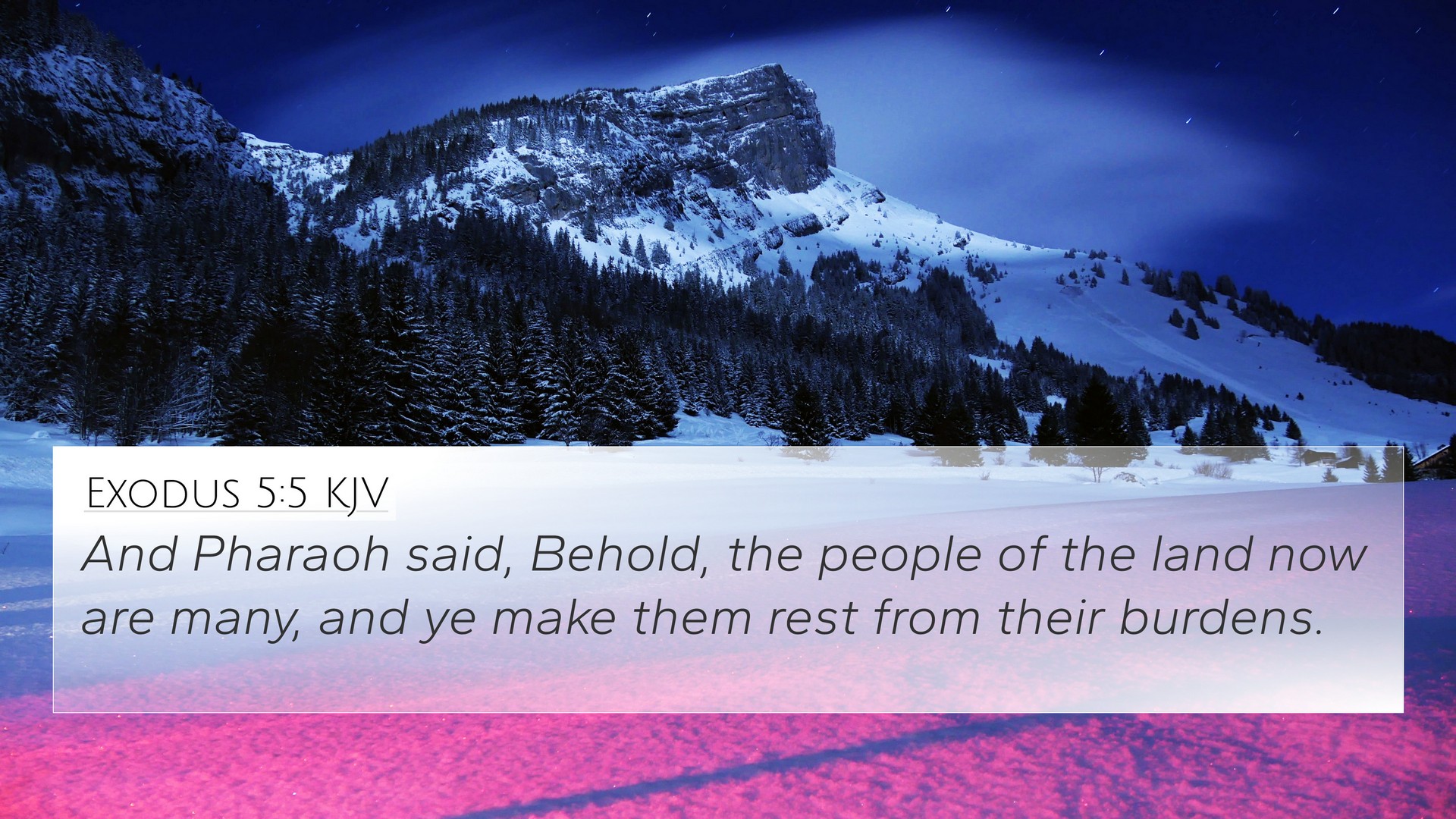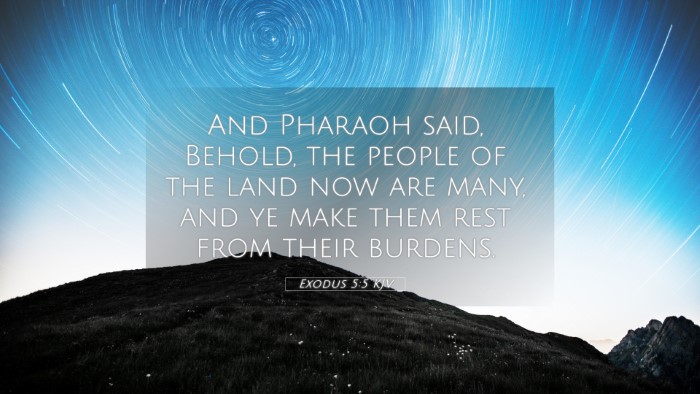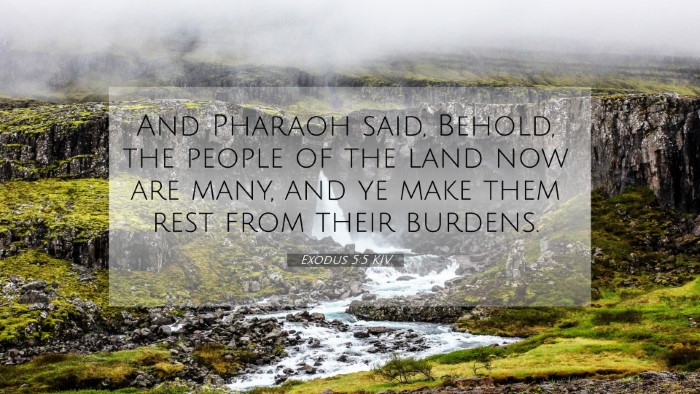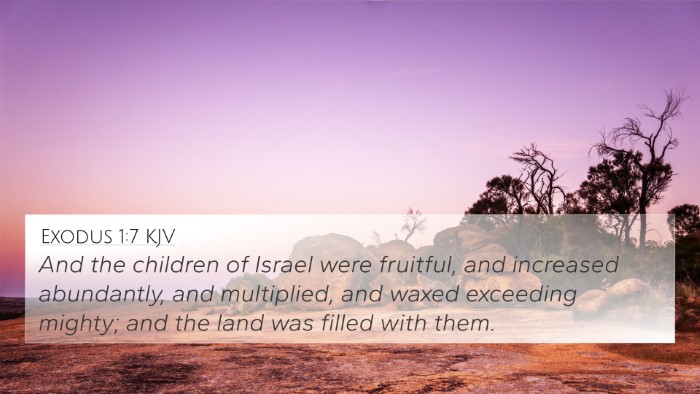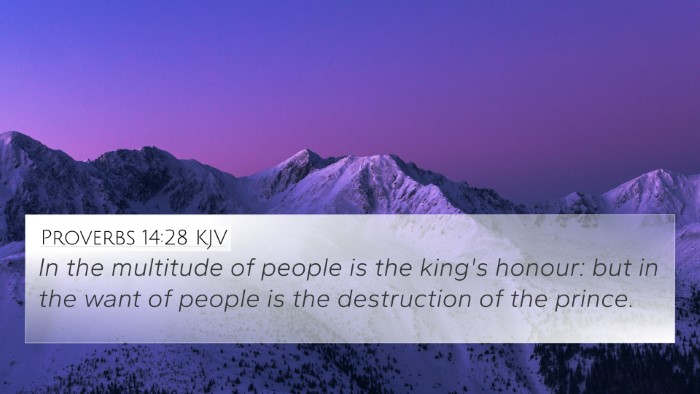Understanding Exodus 5:5
Exodus 5:5 (KJV): "And Pharaoh said, Behold, the people of the land now are many, and ye make them rest from their burdens."
This verse captures a pivotal moment in the narrative of the Israelites' oppression in Egypt. Pharaoh, responding to Moses and Aaron, recognizes the growing number of Israelites and feels threatened by their presence and the potential for unrest.
Verse Meaning and Commentary Insights
Matthew Henry's Commentary
Matthew Henry emphasizes the pride and obstinacy of Pharaoh, showing his increasing fear of the Israelite population. He notes that Pharaoh perceives the Israelites as a threat, and his reaction is to increase their burdens rather than listen to the request for their freedom. This reflects an overarching theme of resistance to God's plans and serves as a lesson on human pride against divine will.
Albert Barnes' Notes
Barnes provides insight into the socio-political context, explaining that Pharaoh's concern about the Israelites becoming numerous indicates a broader fear of rebellion. Barnes points out that Pharaoh's reply is emotionally charged, revealing his harshness and unwillingness to consider the suffering of the Israelites. Instead of addressing their burdens, Pharaoh chooses to impose even greater hardships.
Adam Clarke's Commentary
Clarke focuses on the implications of Pharaoh's statement. He asserts that Pharaoh's decision to impose harder labor correlates to his desire for control and stability. Clarke suggests that Pharaoh's fear of rebellion illustrates the natural human tendency to resort to tyranny to quell perceived threats. His commentary highlights the irony that the more Pharaoh tries to suppress the Israelites, the closer they come to their freedom.
Bible Verse Cross-References
Exodus 5:5 can be linked to several other Bible verses that explore similar themes of oppression, resistance, and divine intervention:
- Exodus 1:10 - "Come on, let us deal wisely with them; lest they multiply, and it come to pass, that, when there falleth out any war, they join also unto our enemies, and fight against us, and so get them up out of the land."
- Exodus 1:14 - "And they made their lives bitter with hard bondage, in mortar, and in brick, and in all manner of service in the field: all their service, wherein they made them serve, was with rigor."
- Exodus 3:19 - "And I am sure that the king of Egypt will not let you go, no, not by a mighty hand."
- Numbers 20:15 - "How our fathers went down into Egypt, and we have dwelt in Egypt a long time; and the Egyptians vexed us, and our fathers."
- Deuteronomy 26:6-7 - "And the Egyptians evil entreated us, and afflicted us, and laid upon us hard bondage: and when we cried unto the Lord God of our fathers, the Lord heard our voice..."
- Psalm 105:25 - "He turned their heart to hate his people, to deal subtilly with his servants."
- Acts 7:19 - "The same dealt subtilly with our kindred, and evil entreated our fathers, so that they cast out their young children, to the end they might not live."
Thematic Connections
Exodus 5:5 is thematically resonant with various passages across the Bible that depict the struggle of the oppressed. The contrasts drawn between the oppressor (Pharaoh) and the oppressed (Israelites) reflect broader biblical narratives of freedom and divine liberation. These narratives often depict God’s faithfulness in rescuing His people from their dire circumstances.
Cross-References and Study Techniques
For those exploring cross-referencing biblical texts:
- Utilize a Bible concordance to identify related themes and verses quickly.
- Refer to a cross-reference Bible study guide to gain insight into how different verses relate.
- Consider employing cross-referencing Bible study methods to explore thematic connections in-depth, such as narrative techniques or typology.
- Engage with comprehensive Bible cross-reference materials to enhance your scriptural understanding.
Conclusion
Exodus 5:5 serves as a crucial point that reflects God's overarching plan for salvation amid human oppression. The insights gathered from various commentaries underscore the importance of recognizing the historical and theological dimensions of this verse. As believers seek to understand the messages of the Bible, cross-referencing these narratives provides a richer perspective on God's enduring justice and mercy.
Keywords for Further Study
As you delve into the connections surrounding Exodus 5:5, consider the following keywords for your studies:
- Bible verse parallels
- Linking Bible scriptures
- Scriptural cross-referencing
- Inter-Biblical dialogue
- Identifying connections between Old and New Testament
